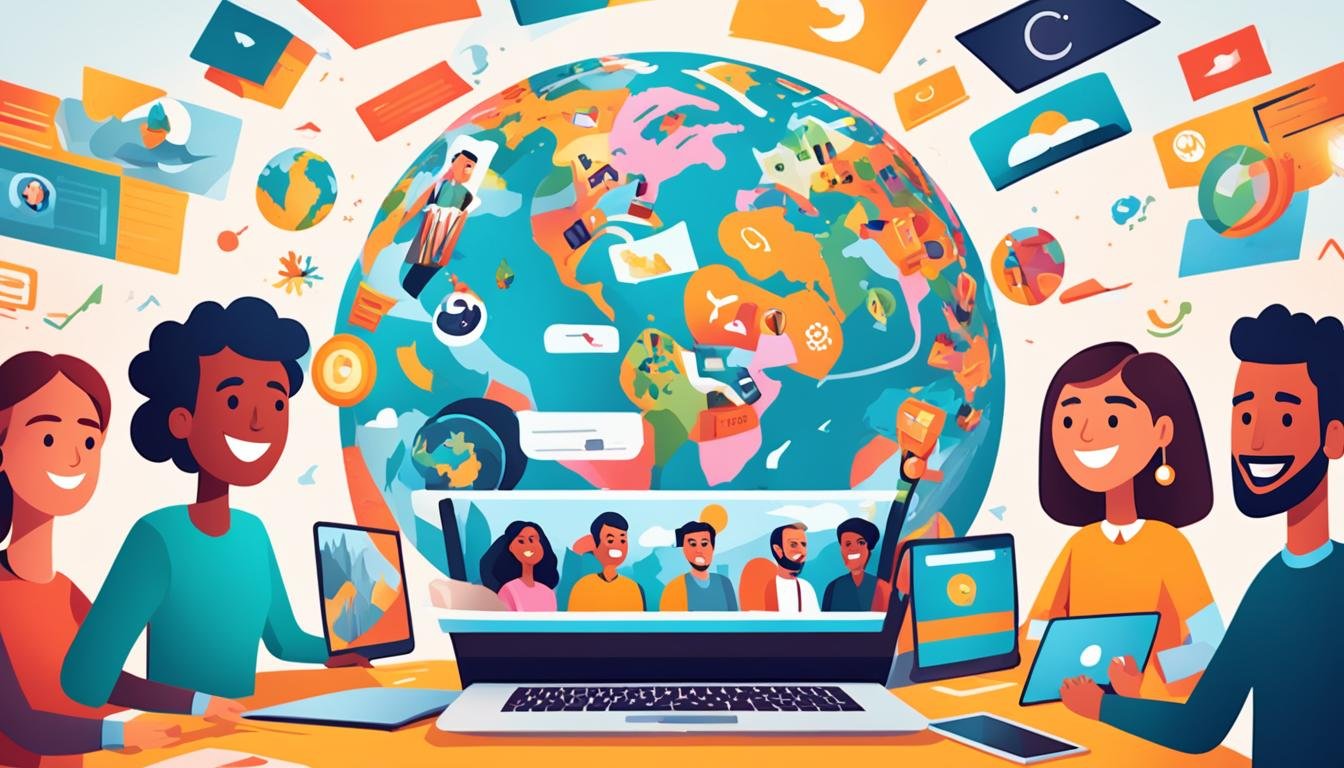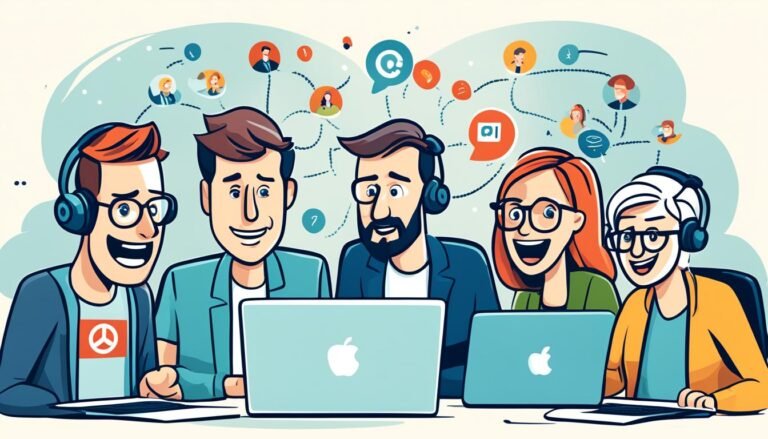Intercultural Communication Training Online
How can we approach the challenges of talking across cultures in a world that’s more connected than ever? Does training online really help us understand others and build strong relationships?
Think about our world today. Getting good at talking with people from all over can really make a difference in our lives and jobs. We need to learn how to understand and work with different ways of speaking, thinking, and acting.
Taking an online course on talking across cultures can boost your skills. It can make you better at talking with anyone, no matter where they’re from. But does online learning work as well as meeting face-to-face for these talks? Can you really get good at it through a computer screen?
This piece will look into Intercultural Communication Training Online and show you why learning about other cultures online is cool. We’ll share how online lessons can be just as good as meeting in person. Plus, we’ll give you stories of people who got really good at talking with others, no matter where they’re from.
We’ll talk about the big parts of learning to talk with anyone online, share ways to handle hard parts, and talk about why it’s key to keep learning. Get ready to find out how online lessons can help you make friends from everywhere and hold real talks.
But first, let’s talk about why learning to talk to everyone online is super important now.
Enhance Communication in a Globalized World
In our globalized world, talking with others is key to success. Businesses and people are joining from around the world. So, knowing how to connect in different ways is very important. It can be tough but also full of chances. These include learning and growing by understanding and respecting others’ ways.
Joining a program to boost your global talking skills works well. Such programs offer deep training on connecting with others from various cultures. By learning through online lessons, you pick up on small but crucial details. This makes building good relationships and reaching common goals easier.
“Effective communication is not just about speaking a common language, it’s about understanding cultural differences and adapting your approach to connect with people on a deeper level.” – John Chen, CEO of Global Communications Inc.
Online courses on culture fit your own time, making it easy to get better at global talking. Here, you get to use cool tech to practice with others and learn in a virtual world. This helps you get better while still managing your other tasks.
This way, you get to see the world and its people in new ways. Enhancing how you connect and understand others improves both teamwork and your personal skills. It helps in making sure everyone understands each other better, which helps in building bridges and working together well.
Benefits of Enhancing Communication Skills in a Globalized World
Getting better at global talking brings many benefits. First, you get to work well with all kinds of teams. This includes those from different countries or cultures. With the right skills, you can solve problems and spark innovation better.
Second, it could help you get ahead in your career. Employers look for those who can easily make connections with others, no matter the background. Getting good at global speaking makes you a top pick in today’s world.
Lastly, it’s all about being respectful and understanding. By mastering how to talk to everyone, you show you’re open and eager to learn from others. These traits help make our world a better place, free from big conflicts.
So, training in global talking and cultural understanding is really worth it in our connected world. It makes you good at crossing cultural lines and opens more doors for you. Plus, this kind of learning leads to a friendlier, more connected society.
The Advantages of Online Intercultural Training
In today’s world, knowing how to communicate across cultures is key. With online intercultural training, improving these skills is easier. This kind of learning comes with many perks, good for both people and companies.
Flexibility and Convenience
Virtual training means you can learn on your own time. Professionals can squeeze sessions into their busy days. No need to travel, saving time and stress, perfect for those in far-off places.
Web-based Intercultural Workshops
Online workshops are packed with chances to get better at cross-cultural talks. You’ll dive into activities that feel real, like simulations and case studies. These let you learn by doing, sorting out how to best work with other cultures.
In online workshops, you hear from many angles and pick up tips from the pros. They help you learn about cultures and how best to mix with them.
Opportunities for Digital Cultural Sensitivity Training
Digital cultural sensitivity training is important, and online is a great place for it. This kind of learning uses cool tools to help you understand and feel for other cultures. Videos, modules, and quizzes make it fun to learn more and get better at talking with others.
Image
By taking up online training, you’re getting ready to talk across the globe. It’s all about making learning fit your life, and finding new ways to learn and connect with other cultures.
Key Components of Intercultural Communication Training Online
In our global world, knowing how to communicate across cultures is vital. Now, with online training, professionals can learn these skills easily. They gain insights that help them navigate different cultures with success. Here are the main parts of online intercultural communication training:
1. Cultural Intelligence Development
Effective communication across cultures starts with cultural intelligence. Online courses dive into different cultural views, values, and ways of acting. People learn to see and adjust to these differences, which boosts their ability to connect with others from various backgrounds.
2. Global Communication Strategies
Professionals learn a variety of strategies for talking with others around the world. They take part in engaging exercises and look at real-life scenarios. This helps them learn how to communicate well in culturally diverse settings. They find ways to get past language issues, clear up cultural confusions, and earn trust in global business.
3. Verbal and Non-Verbal Communication Skills
Courses highlight the need to be aware of both what we say and how we act when talking with people from other cultures. Participants pick up skills to tweak their talk, mannerisms, and body language to match other cultural customs. This ensures their messages get across and are respected. They also learn the value of listening, showing understanding, and negotiating, all of which makes working together smoother.
4. Cultural Sensitivity and Awareness
Becoming sensitive to and aware of cultural differences is key. Training online helps shed light on our biases and shows ways to squash them. With exercises and training, professionals learn to be more open to various viewpoints. This helps sprinkle empathy and respect into their every interaction.
“Intercultural communication training online tackles multicultural engagement head-on. It helps professionals confidently and thoughtfully navigate different cultural terrains.”
5. Virtual Cross-Cultural Collaboration
Tackling projects with people from various cultures is happening more and more in remote work setups today. Online training gives professionals the tools to work effectively with others from different backgrounds. They learn to find common ground, manage cultural differences, and lead virtual teams. This boosts their success in global work settings.
6. Conflict Resolution and Mediation
Dealing with conflicts in diverse environments is a special challenge. Online courses teach about different cultural ways to handle disagreements. They offer techniques for stepping in to resolve conflicts and negotiate. These skills help in maintaining peace and building strong relationships, whether in a multi-culture team or during business talks.
Online cultural training and e-learning for communication is a great asset for professionals. It offers a flexible, practical way to improve global communication and make cross-cultural interactions successful.
Case Studies: Real-life Examples of Successful Intercultural Communication
In this section, we’ll look at real-life examples of successful intercultural communication. These cases show how the right skills can unite people from different cultures. Organizations and experts put to use these effective approaches from global communication programs and digital sensitivity training.
XYZ Corporation shines in one case study. It’s a big company that works in more than 20 countries. They saw how important good communication between cultures is. So, they started a big program to teach their people how to do it right. This has helped them get closer to their clients and partners all around the world, making their business grow.
“The global communication skills program has been instrumental in breaking down cultural barriers within our organization. It has not only enhanced our ability to communicate effectively but also fostered a greater appreciation for diverse perspectives and cultural nuances.”
– John Smith, CEO of XYZ Corporation
Jane Davis’s story is also very interesting. She’s a marketing executive who took part in a digital sensitivity training. This taught her how to understand cultural differences when making marketing plans. With this new insight, Jane launched a campaign that people everywhere loved. It boosted her brand’s fame and market share.
These stories are lessons on the power of global communication and cultural sensitivity programs. They show how we can bridge cultural gaps to build strong connections and reach our global goals.
Learning from such examples can fuel professionals with fresh ideas. With the right approach to understanding other cultures, we can all thrive. In our tightly connected world, the ability to communicate well across cultures opens many doors.
Overcoming Challenges in Intercultural Communication
Intercultural communication is about dealing with cultural differences. It’s about sharing information across different backgrounds. Yet, it faces challenges like misunderstandings, cultural biases, and language barriers. These can stop effective communication and teamwork in diverse environments.
But, there are ways to beat these hurdles. Taking a course or online training can help. They give you skills and knowledge to connect with others from different cultures.
Understanding Cultural Differences
One big hurdle is understanding cultural differences. Each culture has its own values, beliefs, and ways of talking. Not knowing or respecting these can cause problems and disagreements.
A good course can help you learn. It shows you how to notice and respect cultural differences. By doing interactive activities and talking things over with others, you can learn to adapt. You can make friends across cultures more easily.
Building Cultural Intelligence
Cultural intelligence is key in intercultural communication. It means you can adjust in different cultural settings. This helps you move through unfamiliar places with ease and respect.
Online training can boost your cultural smarts. It gives you tools and tips on cultural do’s and don’ts. This way, you don’t accidentally bother someone. Improving your cultural intelligence builds bridges, leading to better talks and teamwork.
“Intercultural communication is not about erasing cultural differences, but rather about bridging them and finding common ground.”
Fostering Effective Communication in Diverse Settings
Good communication is vital in diverse groups. But, different people and ways of talking can be hard to understand. It can lead to unclear or ineffective communication.
There are courses and online training to help. They offer ways to better communicate in varied settings. They teach you to adapt how you talk and listen. This can grow trust and understanding between different people.
To do well in intercultural communication, you have to be proactive and keep learning. Joining a course or training can give you the tools. These tools help you talk and work with others from various cultures better.
Conclusion: Embracing Intercultural Communication Online
In today’s world, it’s key to understand other cultures. Online Intercultural Communication Training is vital. It helps professionals do well in diverse settings.
Learning online makes it easier. People can join from anywhere at their own speed. This breaks barriers, fitting into busy lives. It means getting better at talking with anyone, no matter where they’re from.
This kind of training gives a real edge. It helps people work better with others from different cultures. They learn how to appreciate and communicate with people’s differences. This opens doors to better teamwork in global workplaces.
To sum up, learning online about other cultures is life-changing. It makes us understand and work well with others around the world. With web training, professionals keep learning. They get better at connecting and making a global impact.
FAQ
Q: Why is Intercultural Communication Training Online important in today’s multicultural world?
A: Intercultural Communication Training Online is key because it teaches people how to talk across cultures. It boosts communication skills worldwide. This helps professionals do well in diverse places.
Q: How can professionals benefit from participating in an online cross-cultural communication course?
A: Online courses can help professionals understand different cultures. They learn how to communicate better in various settings. These skills are vital for working with different people globally.
Q: What are the advantages of online intercultural training?
A: Online training is flexible. It lets people learn about new cultures at their own speed. This approach also breaks down distance barriers and offers diverse cultural insights. Web workshops also focus on digital cultural sensitivity, teaching how to respect and understand others.
Q: What are the key components of intercultural communication training online?
A: Online training usually includes units on cultural intelligence, unwritten cultural rules, body language, and fighting stereotypes. It teaches how to solve conflicts in a global team and how to adjust your communication style. All these parts aim to make you more culturally aware and improve your communication with others.
Q: Can you provide real-life examples of successful intercultural communication?
A: Many companies and individuals have seen great success with intercultural communication. For instance, some big international businesses have used global communication programs to overcome cultural barriers and succeed. Also, people who took online cultural sensitivity courses have shown they can understand and talk to others from different cultures better.
Q: How can participating in a cross-cultural communication course or online cultural competence training help overcome challenges in intercultural communication?
A: Courses can give you real-life tactics to handle communication issues between cultures. They boost your cultural understanding and teach you how to adjust and speak effectively in any culture. These skills are crucial for working or interacting with people from all over the world.
Q: Why should professionals embrace Intercultural Communication Training Online?
A: It’s important for professionals to use online training to keep learning and add to their skills in our connected world. These courses are easy to fit into your schedule. They make you more aware and sensitive to others’ cultures and improve your global communication ability. Online training prepares you to excel in diverse cultural settings.








